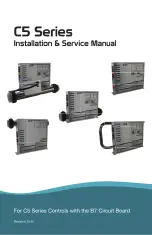
4
FIGURE 6 -
RAPID EXHAUST
FIGURE 7 -
EQUALIZING (SLOW) APPLICATION
FIGURE 8 -
EQUALIZING (SLOW) EXHAUST
LOAD PISTON
INLET/EXHAUST
VALVE
CONTROL PORT
DELIVERY PORT
SUPPLY PORT
RELAY PISTON
EXHAUST
LOAD PISTON
INLET/EXHAUST
VALVE
CONTROL PORT
DELIVERY PORT
SUPPLY PORT
RELAY PISTON
LOAD PISTON
INLET/EXHAUST
VALVE
CONTROL PORT
DELIVERY PORT
SUPPLY PORT
RELAY PISTON
RAPID EXHAUST
Figure 6 shows a rapid service brake release. Air above
the relay piston travels back out the control port to be
exhausted. With the lack of air pressure above the
piston, air pressure below lifts the piston, closing the inlet
and opening the exhaust. Delivery air then exhausts to
atmosphere.
EQUALIZING (SLOW) APPLICATION
When a control signal enters the R-12P
™
valve, it acts
on the relay piston. However, Figure 7 shows the control
signal passing through the valve without causing piston
movement. The air is passing through the relay piston’s
equalizing orifi ce, directly through the valve and out the
delivery port to the next valve in the air system. This
situation occurs if air pressure build-up is slow and the
pressure above the relay piston is not strong enough to
open the valve. (Air pressure above the piston must be at
least 3 psi greater than air pressure below the piston to
cause movement.)
In the equalizing application, even though the inlet valve
does not open, the control signal is not decreased because
the equalizing orifi ce allows it to pass directly through the
R-12P
™
valve. Note that this condition exists during very
slow service brake applications.
For example, if a vehicle is traveling over a long downhill
grade, the driver may want to limit speed and maintain
vehicle control through proper gearing, engine speed and
a light service brake application.


























